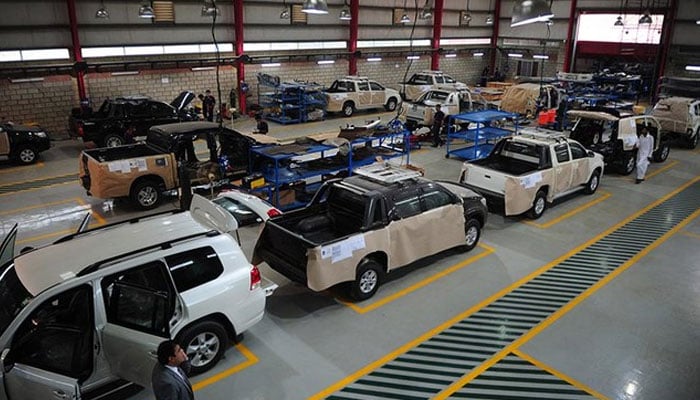Local Auto Industry seeks govt help to stem imported cars influx
KARACHI: The automobile industry in Pakistan, a crucial contributor to job creation and government revenue, is currently facing significant challenges due to the influx of imported cars driven by the government's lenient import policies. This surge in imports, particularly of used cars, is severely impacting the already struggling local auto industry, undermining its efforts in achieving localization. Reports indicate a staggering increase in imported used cars, surpassing 6,000 units in the financial year 2022-23, with over 1,200 units imported in May and June alone.
Initially intended to benefit overseas Pakistanis, the allowance for used car imports has been exploited through corrupt practices, with vehicles being imported under their names, but used for profit-seeking ventures. This exploitation further exacerbates the strain on the local auto industry, which is vital for a developing country like Pakistan.
Despite its challenges, the local industry ranks among the few globally capable of manufacturing a diverse range of vehicles, including passenger cars, trucks, buses, and tractors, with over 60 percent localization achieved through the production of high-quality, internationally tested components.
Moreover, the industry operates under heavy tax burdens, often resulting in inflated retail prices that include over 100 percent of taxes and duties. Yet, it remains a sector committed to conducting transactions through legal banking channels.
Recognizing the major role of the automotive sector in Pakistan's economic growth, the stakeholders are calling on the government to reassess its policies, advocating measures that promote a conducive environment for the local industry growth, job creation, increased economic contribution, and alignment with the national development objectives. Such support is essential to sustain and enhance the competitiveness of the local auto industry in the global market, while addressing the challenges posed by unchecked imports.
-
 Prince William Questions Himself ‘what’s The Point’ After Saudi Trip
Prince William Questions Himself ‘what’s The Point’ After Saudi Trip -
 James Van Der Beek's Friends Helped Fund Ranch Purchase Before His Death At 48
James Van Der Beek's Friends Helped Fund Ranch Purchase Before His Death At 48 -
 King Charles ‘very Much’ Wants Andrew To Testify At US Congress
King Charles ‘very Much’ Wants Andrew To Testify At US Congress -
 Rosie O’Donnell Secretly Returned To US To Test Safety
Rosie O’Donnell Secretly Returned To US To Test Safety -
 Meghan Markle, Prince Harry Spotted On Date Night On Valentine’s Day
Meghan Markle, Prince Harry Spotted On Date Night On Valentine’s Day -
 King Charles Butler Spills Valentine’s Day Dinner Blunders
King Charles Butler Spills Valentine’s Day Dinner Blunders -
 Brooklyn Beckham Hits Back At Gordon Ramsay With Subtle Move Over Remark On His Personal Life
Brooklyn Beckham Hits Back At Gordon Ramsay With Subtle Move Over Remark On His Personal Life -
 Meghan Markle Showcases Princess Lilibet Face On Valentine’s Day
Meghan Markle Showcases Princess Lilibet Face On Valentine’s Day -
 Harry Styles Opens Up About Isolation After One Direction Split
Harry Styles Opens Up About Isolation After One Direction Split -
 Shamed Andrew Was ‘face To Face’ With Epstein Files, Mocked For Lying
Shamed Andrew Was ‘face To Face’ With Epstein Files, Mocked For Lying -
 Kanye West Projected To Explode Music Charts With 'Bully' After He Apologized Over Antisemitism
Kanye West Projected To Explode Music Charts With 'Bully' After He Apologized Over Antisemitism -
 Leighton Meester Reflects On How Valentine’s Day Feels Like Now
Leighton Meester Reflects On How Valentine’s Day Feels Like Now -
 Sarah Ferguson ‘won’t Let Go Without A Fight’ After Royal Exile
Sarah Ferguson ‘won’t Let Go Without A Fight’ After Royal Exile -
 Adam Sandler Makes Brutal Confession: 'I Do Not Love Comedy First'
Adam Sandler Makes Brutal Confession: 'I Do Not Love Comedy First' -
 'Harry Potter' Star Rupert Grint Shares Where He Stands Politically
'Harry Potter' Star Rupert Grint Shares Where He Stands Politically -
 Drama Outside Nancy Guthrie's Home Unfolds Described As 'circus'
Drama Outside Nancy Guthrie's Home Unfolds Described As 'circus'




